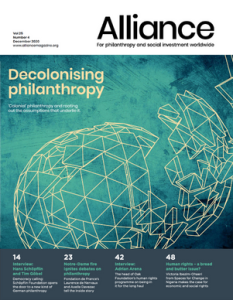On situated knowledge, locus of enunciation, and other migrations – the story of Spain’s Calala Fondo de Mujeres
We are a group of diverse women who understand ourselves as a mixed foundation. We are natives and migrants who have committed to working in a different way – one that honours the path of all the women we accompany so that they can have the power to decide the life they want to live. We are committed to learning to work at ease, or to work tasty, as we like to say. To do what we do in the best way while enjoying the process. Having a job that allows us to lead a life worth living and is worth the joy. And to feel that our working place, where we spend the most of our hours, is a safe space.
The Calala Women’s Fund
Although Calala Women’s Fund has a history linked to Central America, working with women from colonized peoples, our decolonial process itself began in-depth in 2019. Firstly, at the initiative of some migrant teammates and then, as a collective commitment to improve our work with the groups we support, since we realized how crucial it was to ensure that colonial violence was not reproduced in our practices, both internally and externally. In 2019, Calala Women’s Fund decided to carry out a study about the migrant women’s movement in Spain, with our grantees and others, to learn how we could better support it. Even though we were committed to conducting the study with a collaborative, feminist and antiracist approach (we used the Movement Capacity Assessment Tool, developed by Global Fund for Women, and we consciously chose a researcher who was herself a migrant woman, feminist and an antiracist activist), our grantees rapidly showed us that we still had a lot to learn.
After three years, we learned that we truly need to listen to the groups and people we support, actively and with a decolonial perspective, which means not assuming that we know more about their needs than they do. We also have learned to acknowledge our abilities as a team, attributing a fundamental value to the diversity that comes from coming from different realities, with different backgrounds and personal trajectories. One of our main challenges continues to be putting in place the decolonial approach in a transversal way, by applying the lessons learned and the tools that we have collectively built, in order to prevent and repair racist and colonial violence. When we’ve previously told the story about how our organisation began the work of incorporating an anti-racist and decolonial perspective, we’ve highlighted the luminous aspects of sharing, learning, and joy – but also the efforts, the time invested and the self-criticism that this path has brought to the team members, especially those who are migrants, like us.
A first step into a new mindset
Incorporating the decolonial gaze includes many different elements, but deconstructing ourselves as feminists has been the first journey that many of us have undertaken at Calala Women’s Fund because deconstructing feminism requires understanding our situation of oppression in a cis-heteropatriarchal system.
Of course, our different backgrounds give us different starting points. For us, migration has shaped our thinking in a way that it otherwise wouldn’t if we never left our place of origin, leaving behind certain invisible walls.
None of these are easy topics to deconstruct. Recognizing our privileges, or non-privileges, of class, as well as the importance of the ‘Pantone[1] of miscegenation’, the broad chromatic inventory that goes further than the colonial and racist white, yellow, and black, and where value seems to lie the closer one gets to white. Becoming aware of ‘white passing’ privilege that is, if not totally invalidated, at least very reduced when coming to Europe. Reviewing the colonial history of our ancestry, acknowledging that our cultural capital can be part of our privileges or simply seeing that the inequality and misrule of our countries of origin have put us in a place of privilege or oppression… these are all matters for an organisation to reckon with on its decolonial journey.
We learned that we truly need to listen to the groups and people we support, actively and with a decolonial perspective, which means not assuming that we know more about their needs than they do.
We realize, for example, that we tend to feel closer to people from the global South that are part of the groups supported by Calala. As if the deep roots that unite the history of violence, robbery, and extermination to our peoples would unite us at a much more transcendent – some would say, less rational – level, to later recognize that on the way to inclusion in the European society where you reside, you are distancing yourself from this same community. Because the trace, the colonial wound, is precisely that. It is suddenly finding out that in some cases we have lost the pride of recognizing ourselves as Indigenous, or that we re-ethnicize[2] ourselves from within to build a new identity, taking care not to fall into the same cultural appropriation that we denounce in others. Knowing that our mother tongue, the one inherited from the colony, the only one we speak in many cases, can be associated with oppression, puts us in a position of the victimizer.
We also realize that for some people the only language they speak does not allow them to be read as a valid interlocutor in spaces where the Anglo-Saxon domain gives no respite. The previous merits demand linguistic justice to cope with the annoyance or the offence generated by being considered less capable for not speaking English, the hegemonic language in philanthropy.
Undoubtedly, the journey has been and continues to be challenging and nurturing for each one of us: European whites, whitened South Americans or Central Americans, racialized immigrants and so on for our entire foundation. This is what happens every time we allow ourselves to be permeated by the knowledge of the epistemologies and cosmogonies of Mesoamerica, that have nourished us in Calala since our creation. When we learn from the experience of our colleagues from the team and the board of directors who come from or have lived in that region, as well as when we open ourselves to the contributions resulting from the set of experiences, learning, and life trajectories of those of us coming from South America.
The fusion of experiences and situated knowledge that are intertwined with the professional expertise and the academic and non-academic training of all of us shaping this organization places each of us at a different locus of enunciation. Nowadays, at Calala we recognize ourselves, we observe, read, and write with a multiplicity of points of view and ways of doing. We are sure this will take us to places that we are yet to discover, as we go slowly because we want to go far.
Impact and successes from this experience
One relevant aspect we would like to highlight at this point is a deep commitment and political will that those in directive positions at Calala have shown since the beginning of this process. They have been careful and rigorous in the right measure so that the necessary steps contained both in our new Theory of Change and in our Decolonial Work Plan are carried out. We call this our ‘Plan Alebrije’[3], for the magic emerging from a conformation endowed with diversity that transforms, fluctuates and grants very particular powers to the foundation. That organizational commitment and political will have led us to spare no effort, time or money for making this challenge a constant anti-racist and decolonial affirmation. For example, by being careful in the selection of both Calala’s permanent staff and in the search and selection of external collaborators, so that they have lived experience and, as far as possible, also professional experience and specific knowledge on decolonial feminisms.
We invite other donors to build concrete tools allowing them to take care and be taken care of along the way.
The challenge of decolonising ourselves to decolonise our work as a Fund has impacted us in many ways: it has had an impact on our way of understanding our own work, on our relationship with money, our values, our relationships with our peers, collaborators, and the groups we accompany. It has had an impact on how we address the issue of collective care, the less rational and more transcendent understanding of the role of a Women’s Fund, and it has had an impact on our relationship with ourselves. It has also impacted the way we understand power, how to identify it, manage it, (re)distribute it and grant it. As such, sharing leadership is part of what Calala has been doing, with great achievements and material and human gains, despite the many challenges.
Abundance comes from sharing
‘Solidarity is the tenderness of peoples’[4] goes a well-known phrase – and today we are living by it. Not without first acknowledging that to work in the field of philanthropy and other fields that are part of a policy of redistribution of wealth and social justice – it is necessary to be aware of the needs emerging from the groups we intend to support. In order to be able to contribute to reparations[5], we have to understand otherness as a legitimate otherness, assuming that we have a lot to learn from each other and thus establish virtuous circles of reciprocity.
As a women’s fund, becoming aware of how truly fair it is to contribute to the redistribution of wealth is also reconciling ourselves with the value of money to repair or compensate for damage. A damage that can be as concrete as the case of women who are persecuted, murdered, degraded, and violated in all possible ways, in a context of suffering and vulnerable living conditions caused by exclusion, socio-political instability, armed conflict, scarcity of natural resources and impoverishment.
We encourage other donors who are considering decolonising their practices to take this very seriously. Such a process will not only improve their relationship with the groups and organizations they accompany, but it will also provide them with more and better skills for their overall work. It will show them a new comprehensive way of understanding the continuity of inequity, inequality and global injustice. It will also show them that this reality is transversal and affects all of us and that a lack of awareness makes us just part of it.
Finally, we invite other donors to build concrete tools allowing them to take care and be taken care of along the way. This will be relevant in anticipating the difficulties that will arise, as well as the aggressions or microaggressions that may occur during the process, due to the unconscious effect that colonialism has on every person. In our case, we identified the need to create our Protocol Against Racist Violence, which was developed in conjunction with great fellow decolonial activists. We understand that even as a racially mixed organization that works with migrant women, and descendants of Indigenous people, we can reproduce this violence outside and inside our foundation. And that it is our responsibility to work on the prevention of violence and the promotion of racial justice, as well as to provide all of us sharing workspaces with tools for taking care of ourselves and for counting on specific competencies for the prevention and resolution of conflicts.
Cristal Campillay Alarcón and Paula Riedemann Fuentes live in Barcelona, Spain, and work at Calala Women’s Fund as collective care responsible and program manager. They jointly authored this article from their perspectives as a migrant woman with Diaguita ancestry from northern Chile and as a migrant woman from central Chile.
Upcoming issue: Decolonising philanthropy
 The word ‘decolonisation’ was coined to describe the withdrawal of colonial powers from territories they had occupied. What forms have decolonisation practices taken among foundations? Should philanthropy be making reparations? And what significance does decolonisation have for philanthropic institutions when they are geographically distant from the former colonies? These are among the questions to be explored in the next issue of Alliance. Guest edited by Shonali Banerjee, Centre for Strategic Philanthropy, Cambridge University and Urvi Shriram, Indian School of Development Management.
The word ‘decolonisation’ was coined to describe the withdrawal of colonial powers from territories they had occupied. What forms have decolonisation practices taken among foundations? Should philanthropy be making reparations? And what significance does decolonisation have for philanthropic institutions when they are geographically distant from the former colonies? These are among the questions to be explored in the next issue of Alliance. Guest edited by Shonali Banerjee, Centre for Strategic Philanthropy, Cambridge University and Urvi Shriram, Indian School of Development Management.
Subscribe today to make sure not to miss it!
Footnotes
- ^ Pantone ® is a colour classification and coding system that is the most widely used worldwide. Brazilian artist Angelica Dass’ Humanæ project was the first project to use these codes to show the breadth of colour diversity as a way to combat racism.
- ^ Re-ethnification is a term used in social sciences and history, which refers to a process of cultural recomposition, through which individuals belonging to an ethnic group associate values and meanings with new or pre-existing cultural practices.
- ^ This plan contains measures to incorporate a decolonial perspective in all our policies, to work towards a more horizontal structure, and strengthen our individual and organizational capacities.
- ^ This phrase is attributed to Gioconda Belli, a Nicaraguan poet based in Spain who has been able to subtly express the human dimension of international relations.
- ^ Under the decolonial perspective, ‘reparation’ is based on the idea that when damage is done, it must be repaired. If it is recognized that colonization has been the origin of mass crimes, then there needs to be a reparation. If this reparation is denied, it is because the criminal nature of colonial crimes is being questioned.



Comments (0)
Partnerships emphasize the importance of sharing data, knowledge, and best practices to inform decision-making, evaluate progress, geometry dash lite and learn from both successes and failures.